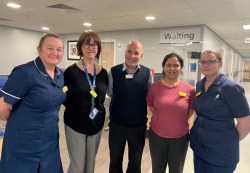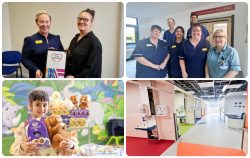Monthly archives: April 2023
Thank you NHS mug

To celebrate the 75th anniversary of the NHS, NHS Charities Together have partnered with the quintessentially British brand, Emma Bridgewater who designed a limited-edition mug.
These handmade and hand painted mugs – which you can personalise with your name – are available to purchase online until Monday 31 July with £5 from each sale being donated to NHS Charities Together.
So, as we gear up towards the NHS’s big birthday, what better way to enjoy your brew than in a very special blue heart mug.
NHS at 75 – telling your story through the lens

To mark its 75th anniversary, the NHS has teamed up with Fujifilm to launch a photography exhibition for NHS staff and volunteers to share their unique stories of the NHS across five categories.
No matter your style or level or whether you’re using a digital camera or your smartphone – we want to see your best photography work and encourage you to be as creative as possible.
The judging panel will choose five winners – one per category – to be displayed at the NHS’s 75th anniversary service at Westminster Abbey on 5 July.
The winning photos, along with 70 commended entries, will also be displayed in a dedicated exhibition in Fujifilm’s House of Photography in London. For more information and to enter, visit https://www.nhs75-fujifilm.com.
Dementia webinar: 16 May
Black Country Healthcare NHS Foundation Trust are hosting a dementia webinar from 10am – 12pm On Tuesday 16 May. Clinical experts will be in attendance to share information and there will also be a training delivery session for carers.
For further information to join the session, please click here.
Message on behalf of Richard Beeken, Chief Executive – appointment of managing director for the MMUH programme company
I am delighted to confirm that our Chief Development Officer, Rachel Barlow has been appointed to the role of Managing Director for the Midland Met programme company.
Rachel will undertake this role in addition to her Board level and executive responsibilities for estates, capital development, regeneration and sustainability.
As you are aware, the MMUH programme company is a temporary structure that will enable the required focus on Midland Met with dedicated capacity and expertise, whilst enabling the core organisation to better focus on delivery of our three strategic objectives (the three Ps) and our in-year priorities.
This has resulted in a review of our organisational structure which now has a managing director for the core organisation and one for the MMUH programme company. As announced a few weeks ago, Daren Fradgley has taken on the role of Managing Director and Deputy Chief Executive for the core organisation in addition to his role as Chief Integration Officer.
Both managing director roles are for a fixed term period, until the MMUH is open and bedded in. The leadership structure of the Trust will then be reconsidered in the context of the wider system picture, in late 2024.
The two roles will report directly to me, allowing me the time to focus on three priorities:
- Cementing and influencing our relationships with multiple partners in the Black Country and Birmingham and Solihull ICSs
- Driving the development of a continuous quality improvement system, and
- Increasing my visibility in our clinical and non-clinical services of the Trust
Industrial action affecting NHS services – BMA industrial action 11 April to 15 April 2023 (inclusive)
The industrial action outlined above will continue until 6.59am on 15 April at the Trust.
Thank you to all colleagues for your support in helping us to maintain safe care during the industrial action. The Trust continue to work closely with the group leads to ensure robust plans are in place to maintain a safe level of service for patients and to support our colleagues who will be taking strike action.
Members of our executive team along with senior colleagues will be conducting wellbeing checks in all areas.
Arrangements for pickets
Further to discussions with local and Regional BMA representatives there will be pickets held on the City Hospital site. The Trust and local BMA representatives will maintain close contact to ensure appropriate support for all colleagues.
Pickets will only run at City Hospital, from 7.30am until 2.30pm each day, with no pickets on Friday.
Picketing is a common feature of industrial disputes. It is agreed between the Trust and the BMA that this will be undertaken peacefully with the purpose of exchanging information or peacefully persuading others to abstain from work.
Pickets may inform people about why they are striking, to seek support and ask people not to:
- do some of their usual work, and/or,
- go into work.
Pickets must not prevent people from going to work or doing their usual work if they want to do so.
As previously outlined, the Trust fully recognise that colleagues may want to exercise their legal right to take strike action. We have created an FAQs document which can be found on Connect for additional information and support about strike action. There are two FAQ documents, one for applicable for all staff groups and a second with pertinent FAQs for medical staff (Industrial Action (swbh.nhs.uk)). We would welcome any additional questions that colleagues may have and would advise that these are directed to your group HR support or to contact the HR advice line on ext. 6680 or via email at swb-tr.SWBH-GM-HR-Enquiries@nhs.net with any queries you may have.
Cancellation of all non-essential business and meetings:
In order to enable clinical and operational teams to plan for and manage patient safety during this period we are standing down all corporate meetings up to and including Tuesday 18 April.
Our Tactical and Strategic Command and Control systems are in place.
Standard operating procedures and support guidelines for consultant colleagues
Consultant colleagues undertaking additional duties can now refer to the attached ‘Consultant Accelerated Syllabus’ for a comprehensive list of Standard Operating Procedures (SOPs) covering routine ward activities, prescribing, requesting, hand over and emergency department specific tasks.
Consultant Accelerated Training Syllabus – Links and Resources v4.4
IT support during industrial action
The IT support line (ext. 4050) will extend their opening hours and will be available until midnight during the industrial action.
Informatics engineers will also be available onsite until midnight across the four days. There will also be IT floorwalkers going around to check on teams and give support where required this includes any issues regarding Unity.
A Unity expert will also be available overnight on-call and can be contacted via the main switchboard.
Completing an IR1 during industrial action
If colleagues identify any issues arising as a direct result of industrial action that require the completion of an IR1, please insert a prefix in the title – Junior doctors industrial action. This is so that we can improve our planning and ongoing resilience
Out of hours food and refreshments
To support colleagues during the industrial action food and refreshments will be available for purchase out of hours at both Sandwell and City Hospitals.
From the 11 – 14 April:
- City – Arches open until 1.30am
- Sandwell – Main reception open until 11.30pm
Food available – snack type items (sandwiches), hot and cold beverages, hot grab go box meals (pizza, baked potatoes and fish and chips/curry).
Supporting patients with timely discharges
As we strive to provide the best possible care to our patients, it’s important that we maintain focus on planning discharges in a timely and effective manner. Doing so helps to minimise unnecessary hospital stays and frees up valuable resources for those in need particularly during this week’s industrial action.
To support us in this effort, we have access to a range of support services, including the Integrated Discharge Hub, Discharge Lounges, and Virtual Wards. These services are designed to make the discharge process as seamless as possible for both patients and staff.
Colleagues in the Integrated Discharge Hub are available to support you. Call them on extension 3147 or via integrated.discharge-hub@nhs.net (open 8am – 8pm, 7 days per week).
The Integrated Discharge Hub on ext. 3147 will offer advice and support for all patients with No Criteria To Reside (NCTR – previously known as “medically fit”).
During every board round and safety huddle please ask the following questions for the MDT to consider:
- Why is this person in hospital? Why not home and why not today?
- What treatment is this person receiving? Could this be continued at home?
- What investigations are they waiting for? Why can’t they be done as an outpatient?
- Why are we re-checking blood tests? Will this change our care or treatment? Why can’t this be done in the community?
- Is this person waiting to see a therapist or specialist team? Why can’t this be done in the community?
If this person is medically optimised (NCTR) why are they still in an acute bed? – call the Integrated Discharge Hub for support and advice on ext. 3147.
Discharge lounges
Remember the discharge lounges are now open 7 days a week from 7am through to 7pm at Sandwell and City Hospital:
- Sandwell – Newton 1
- City – now on D28 (moved from AMU 1)
The lounges are the ideal location for patients who no longer meet the criteria to reside in our acute bedbase. Patients can be stepped down to the lounge whilst awaiting TTOs, transport or transfer to MFFD beds.
Please include the discharge lounge in your patient discharge discussions so they are aware of the journey.
Could your patient be suitable for a virtual ward?
Virtual wards aim to prevent avoidable admissions into hospital and support early discharges by providing a safe and efficient alternative to NHS bedded care through the use of technology. Patients are able to receive high quality care delivered through a multidisciplinary team led by a named consultant practitioner with clear lines of clinical responsibility and governance.
Intensive monitoring through telehealth, telephone calls and home visits keeps patients in close contact with the team delivering their care, ensuring they feel well connected and supported when in their own surroundings.
If your patient is suitable for a virtual ward, speak to the team on 0121 507 2664 option 1 and then option 4.
Heartbeat: Revolutionary myeloma research offers new hope for patients

Myeloma is a type of blood cancer that is caused by abnormal plasma cells in the bone marrow. This can cause a range of unpleasant symptoms, including bone pain, an increased risk of infections, fatigue and kidney failure. It mainly affects people over the age of 65, but can also be diagnosed in much younger individuals. In the UK, around 2 per cent of all cancers diagnosed are myeloma and it accounts for 15 per cent of blood cancers.
Fortunately, research in myeloma at SWBH has greatly improved the survival and quality of life of myeloma patients. Over the last 50 years, the one-year survival rate has increased from 37 per cent to around 85 per cent in 2020. This is due to an increased understanding of the disease and the development of new treatment options through research.
In the early 2000s, treatment options were severely limited, but a trial of thalidomide led to the first new drug approved for myeloma treatment in over three decades. Since then, there have been many trials that have led to more treatment options for patients. Dr. Farooq Wandroo, Lead Haematology Research Consultant, has been involved in some of these trials, which have led to changes in best practice throughout the world.
One such trial, Myeloma XI, was the world’s largest national trial open at our Trust for newly diagnosed myeloma patients. It compared the use of cyclophosphamide and dexamethasone in combination with either thalidomide or lenalidomide. This trial showed that the use of lenalidomide as maintenance therapy led to a significant benefit to all patients for progression-free survival as well as overall survival. As a result, NICE recommends the use of lenalidomide as maintenance treatment for newly diagnosed myeloma patients after autologous stem cell transplant.
SWB also participated in the Tackling Early Morbidity and Mortality in Myeloma (TEAMM) trial, which showed that giving antibiotic prophylaxis during the first three months of treatment prevents pneumonias in myeloma patients. This research has been published and has led to changes in practice around the world.
Unfortunately, patients with high-risk subsets of myeloma have benefited less from these therapeutic advances. The new Risk-Adapted therapy Directed According to Response (RADAR) trial aims to identify myeloma patients with high-risk disease at presentation through cytogenetic testing. By identifying these patients early, it would allow for new targeted novel anti-cd38 antibodies to improve their outcome, which would not be possible without the trial.
SWB has also created a myeloma patient support group (MMSG) to keep patients aware of new developments. In addition, we are participating in a number of collaborative research projects via West Midlands Research Consortium (WMRC) and basic translational research with the University of Birmingham. With MMUH coming, these collaborations will provide exciting life-changing treatments for patients. Overall, research in myeloma at SWB has made significant progress in improving the survival and quality of life of myeloma patients, and the future looks promising for continued advances in treatment options.
Chief Executive’s Message – Friday 7 April

I was delighted to see the new Medical Same Day Emergency Care facility (SDEC) open to patients this week at Sandwell General Hospital. This is an important development for us and aims to enable clinical teams to see and treat patients on the same day, avoiding the need for an unnecessary hospital admission. Congratulations to all the teams involved in getting this facility open and the clinical pathways in place to make it a success.
The SDEC model is a core part of our future Trust plans and forms an essential component of the care model needed for Midland Met. Due to the importance of the new hospital development, one in three of my Friday messages now focuses on key aspects of the Midland Met programme.
This week, the executive team and Midland Met Programme Company leaders met together as part of the programme’s monthly governance cycle. One of the topics for discussion was assurance over our plans to avoid preventable hospital admissions (which we know can cause patients unnecessary harm) and subsequently enable the right “fit” within the new building. As we all know, our inpatient beds – acute and community – come under pressure throughout the year, usually peaking over the winter months. We need to make sure that the Midland Met inpatient beds are sufficient to meet the needs of our population.
Detailed work has taken place to model the beds required. There are some significant schemes in place that are enabling us to reduce the number of days patients need to spend in hospital (Length of Stay or LOS) or avoid a stay altogether. We are seeing this work pay off in Sandwell. Looking at the data is showing us that there are six key schemes that will make the most difference:
- Frailty Intervention Team
- Acute and Community Heart failure Services
- Same Day Emergency Care (SDEC)
- Care Homes Support
- Frailty Virtual Ward
- Respiratory Virtual Ward
Some of this work is already in place with great results such as the additional support provided to care homes in Sandwell which has resulted in a reduction in admissions from over 20 per month before the service started to consistently less than 10 and zero in January. Some services need expanding such as the virtual wards which we believe can avoid admissions , reduce length of stay and reduce approximately 23 acute beds. Other schemes need to be replicated across Birmingham which has different complexities in terms of community pathways so that patients have equitable services no matter what their residential postcode.
What we need to do to as we embed or expand these schemes is ensure that we are able to safely reduce the number of acute beds . This is no easy task and relies on us all to be focused on discharging patients at the right time, or supporting patients better in their own homes. It is also not something we can fix on our own and we are relying on partner organisations across the Birmingham & Solihull and Black Country systems to act on their bit of the pathway. Helpfully, we have good engagement and support for this work which is mutually beneficial and will also demonstrate better outcomes and experiences for patients and their carers. This is also a key part of our winter planning. With these schemes developing throughout 2023 we expect to be in a much better position going into the winter months.
As we head into another period of industrial action, our focus this week has been very similar to the focus needed as we prepare for Midland Met. We have asked which of the patients in a hospital bed can be safely discharged home with the right support in place that will support safe services next week. Sandwell SDEC is key milestone along this journey and it is great to see it operational.
Have a Happy Easter.
Richard
Message from BCPS Chemistry – chemistry analyser equipment issues
Due to multiple chemistry analyser equipment issues, general chemistry investigations are likely to be delayed throughout the Easter Bank holiday period and potentially for longer.
Samples should continue to be requested and delivered to your local chemistry laboratory as normal.
Please help support the laboratory by limiting non urgent sample requests and limiting phone calls where possible, and minimising the number of add on test requests.
We apologise for delays in reporting results during this period and will continue to prioritise urgent samples. Please be assured, new equipment is planned to go live at the end of April 2023 to improve future service provision.
Declaring Interests
It’s fundamental that all colleagues are transparent and adhere to both our local policy and guidance set out by NHS England and declare any appropriate conflicts of interest against the clearly defined rules. Our ‘decision making staff’ are required to make either positive or nil declarations, aligned to each financial year. All other grades of staff are required to make positive declarations on receipt of any gift, hospitality or sponsorship or any known interest that may be a conflict to them and the Trust.
If you have a previous declaration on the system, please review and update the date from: 1 April 2023 to 31 March 2024. This will then refresh your declaration for this year.
Please click here to see instructions.
Our compliance of this will be monitored through our Counter Fraud Auditors and into the Audit and Risk Committee and Trust Board.
As NHS staff, we need to declare any interests – including gifts, hospitality or sponsorship received from third parties – to ensure transparency on how public funds and assets are being used and accessed. This will bring the Trust in line with the NHS England Guidance.
It’s important to know that having an interest isn’t necessarily a problem – it’s the perception that can be damaging to individuals and the Trust, especially if something isn’t declared – but it is necessary to be open about what interests we have so that they can be taken into account in the appropriate way.
All staff are required to declare any interests on appointment and again if they change job or their circumstances change (e.g. they take on a second job outside of the Trust).
Additionally, all ‘decision-making staff’ are required to make a declaration, even if it’s just to say they have no interests to declare. These declarations will be published on the Trust website to ensure openness and transparency.
‘Decision making staff’ are defined as the following:
- Executive and Non-Executive Directors (including Associate Non-Executive Directors)
- Those at Agenda for Change band 8c and above
- Medical Consultants
- All staff in the Procurement Team
- All staff listed as having delegated financial authorities per the Scheme of Reservation and Delegation
Some key tips on what to declare:
- Any non-cash/voucher gift (e.g. from a patient) of over £50 (gifts under £50 don’t need to be declared but it’s good practice to)
- Any sponsorship received from suppliers/individuals
- Any secondary employment or private practice
Staff should also always:
- Decline gifts of cash or vouchers (to individuals) – cash donations can be made as a donation to the SWB charity
- Decline any gifts from suppliers or contractors doing business (or likely to do business) with the Trust
There is helpful specific guidance from NHS England for the following staff groups:
- Q&A for Managers: https://www.england.nhs.uk/wp-content/uploads/2017/09/coi-qa-provider-managers.pdf
- Q&A for Medical Staff: https://www.england.nhs.uk/wp-content/uploads/2017/09/coi-qa-medical-staff.pdf
- Q&A for Clinical Staff: https://www.england.nhs.uk/wp-content/uploads/2017/09/coi-qa-clinical-staff.pdf
Further guidance on how to make any declarations on ESR will be shared shortly.
The Trust’s Associate Director of Corporate Governance / Company Secretary can also help provide advice on interpretation of the guidance; however decisions about what to declare or not are the responsibility of individuals. Please don’t hesitate to contact the Associate Director of Corporate Governance / Company Secretary, Dan Conway, at swbh.declarations-admin@nhs.net if you have any questions.
← Older items Newer items →